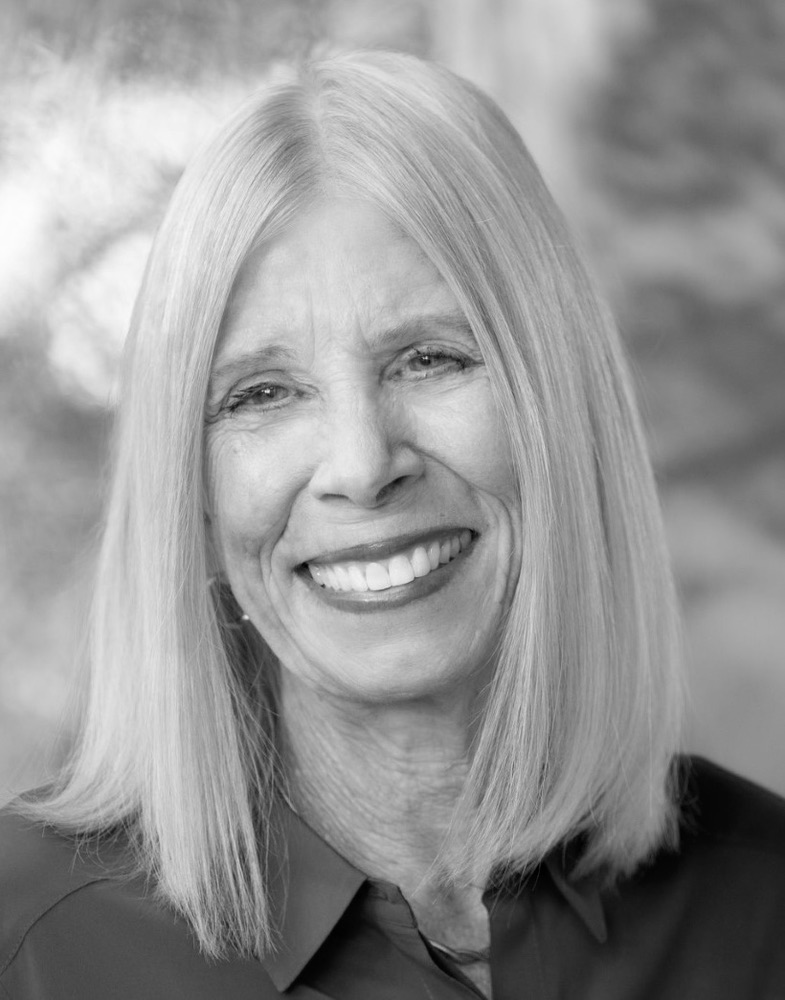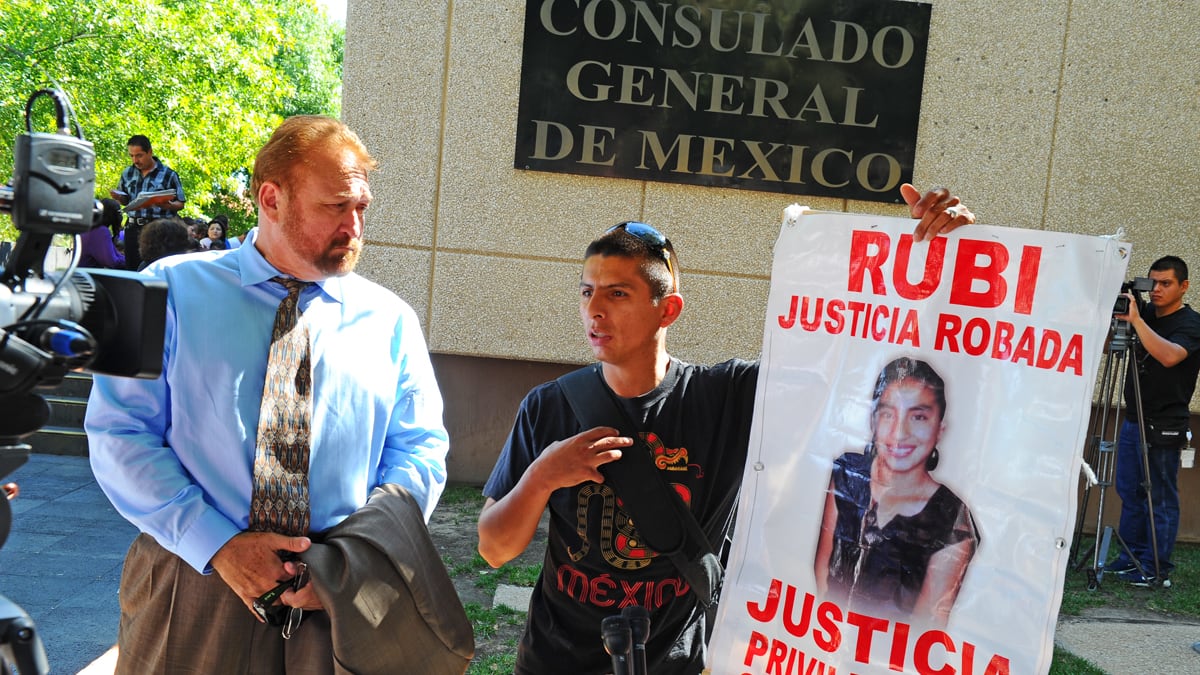On a sweltering morning in late September, Carlos Spector, a 57-year-old immigration lawyer with a red beard and a boxer’s physique, marched gravely behind a client on the sidewalk fronting the Mexican consulate in El Paso, Texas.
The client, a 34-year-old Mexican named Juan Escobedo, said he marched to highlight lack of accountability from the Mexican government over the murders of his sister, whose bones he found near some Juarez-area hog pens, and his social-activist mother, who was gunned down in front of a government building in Chihuahua state in 2010.
“We are unveiling a mask of horror,” said Spector, who has recently secured a string of political asylum victories for Mexican journalists and activists escaping murder and mayhem in their mother country.
Since January 2007, Mexico has had about 86,000 homicides, according to New Mexico State University librarian Molly Molloy, who totals the death count from annual reports issued by government agencies in Mexico. The murder rate in Mexico is almost five times higher than the murder rate in the United States, Molloy said during an interview in her Las Cruces office. ”Mexico is a human rights disaster,” she told The Daily Beast.
But a flawed political asylum bureaucracy in the United States that may force applicants to be detained for months in U.S. Immigration and Customs Enforcement (ICE) detention centers—without adequate legal representation while facing tight deadlines, rigorous post 9/11 rules, and judges who are either lax or strict—prevents many who fear for their lives from obtaining political asylum, according to a recent report by the Migration Policy Institute (MPI), a non-partisan immigration think tank in Washington, D.C.

What’s more, according to Spector, a lot of Mexicans don’t know asylum is available to them. Only 192 Mexicans were granted political asylum in 2010, out of a total of about 20,000 successful applicants, the MPI report says.
These are “extraordinarily low numbers,” given the unrest and violence aimed at certain groups, like journalists, in Mexico, said Donald Kerwin, who authored the MPI report and is the executive director of the Center for Migration Studies in New York.
This makes Spector’s string of three successful asylum cases in recent weeks all the more noteworthy. And the lawyer expects the numbers of Mexican asylum applicants to swell now that bloggers and tweeters are in the crosshairs. (In mid-September, two corpses were found hanging from a bridge in Nuevo Leon, along with a note to social media types to keep mum about violence and corruption. A few days later, in the border town Nuevo Laredo, authorities found the beheaded and dismembered corpse of a newspaper editor who covered crime on social media, according to Fox News.)
But Spector takes issue with the Mexican government’s notion that drug cartels are doing all the killing.
“The primary persecutor of the Mexican people is the Mexican state,” Spector told me as we sat in his office, an old house in historic El Paso.
One client, Mexican social activist Cipriana Jurado, said in her successful political asylum application that she harbored a “well-founded fear of persecution” by the Mexican military and federal police. Two other clients—a daughter-in-law of an assassinated activist and a journalist—obtained political asylum after claiming the Mexican government would not or could not protect them from persecution.
These victories, Spector contends, “break the myth that all of the violence in Mexico is due to drug trafficking.”
Not so, said Ricardo Alday, a spokesman for the Mexican Embassy in Washington, D.C. “The Government of Mexico takes very seriously the protection of all its citizens. Unfortunately, transnational organized crime does not discriminate and journalists have become one of their targets. We are doing everything in our power to guarantee the security and wellbeing of all Mexicans, and will continue to do so. The Government of Mexico fully encourages and defends freedom of the press and freedom of expression, essential components of any truly democratic society,” he wrote in an email to The Daily Beast.
One fact that isn’t in dispute is that Mexicans are living through a nightmarish crime wave. While groups like Human Rights Watch have long denounced the violence in Mexico, it’s not entirely clear who’s doing the killing. Few of the cases are ever thoroughly investigated, Molloy said.
Spector takes this violence personally. His Mexican mother’s family came from a village in Chihuahua state, and his father was a Jewish lawyer from Brooklyn. Spector studied law after stints in the military and a “leftist kibbutz in Israel.”
His loyalty to the Mexican people drives him to advocate for them in the legal world--he holds workshops for political asylum lawyers in the United States and files bar complaints against those attorneys who file frivolous political asylum applications because they sully the movement.
Spector represents many high-profile asylum-seeking Mexican journalists and activists pro bono on one condition—that the exiled Mexicans go public with their stories. Several cases are in the pipeline, waiting to be adjudicated either by Department of Homeland Security asylum officers or in immigration courts administered by the U.S. Department of Justice.
Forty-two-year-old Saul Reyes, a baker and social activist from Spector’s ancestral village in the Valle de Juarez, awaits his political asylum decision. He sought political asylum earlier this year after six family members (five siblings and a sister-in-law) were slaughtered by unknown killers.

In an interview in his small El Paso apartment, Reyes told me his relatives were social activists who had demonstrated against government corruption. Two brothers (one was paralyzed from a stroke) and the sister-in-law were tortured before they were killed. Their bodies were buried for a couple of weeks, and then disinterred and thrown on a road. Reyes identified the corpses.
Framed photographs of the slain relatives hang on his living room wall.
The Reyes killings have not been solved. Mexican officials claimed that one member of the Reyes family was a drug trafficker, and suggested the murders could have been drug-related.
Reyes has repeatedly denied the allegation.
He suffers from survivor guilt. He has flashbacks. He wonders if his activism is worth the deaths. Still, he said, “I won’t shut up,” and vowed to continue his activism on this side of the border by lobbying for a thorough investigation of his relatives’ killings.
Seeking justice for the murder of relatives in Mexico is a common goal for many of Spector’s political asylum clients. Juan Escobedo, the son of famous activist Marisela Escobedo, who was shot to death in front of a Chihuahua government building last December as she was protesting a botched investigation of her daughter’s murder, can’t return to Mexico because he has received death threats.
But as Escobedo marched in front of the consulate in El Paso, he said he would continue his activism in the United States—by pushing the Mexican government to investigate his mother’s death. He didn’t want her to become “just another statistic.”
“These people,” Spector said as he stood sweating beside Escobedo in front of the consulate, “are true heroes.”






